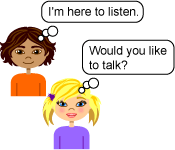Back to top
HOW CAN I TELL IF SOMEONE MIGHT IS FEELING SOCIAL ANXIETY?
Social anxiety is an intense fear and avoidance of social situations. Kids who have social anxiety may worry that
others will think badly of them, or that they will do something embarrassing and be made fun of. There are many
situations that may be difficult for kids with social anxiety, like giving a presentation, speaking up in class,
performing in front of others, meeting new people, starting conversations, inviting friends to hang out, or going to parties.
Some signs of social anxiety are:
| Racing heart
|
Blushing
|
| Sweating
|
Trembling
|
| Stumbling over your words
|
Shortness of breath
|
| Upset stomach, nausea
|
Feeling dizzy
|
| Trouble focussing or concentrating
|
|

Social anxiety can cause us to have negative thoughts and feelings about ourselves. We may spend more time alone because we think,
"I'm a loser" or "I'll embarrass myself" or "I'm boring". It can feel overwhelming to have these thoughts and feelings without ways
to cope or manage them.
Back to top
HOW CAN I ENCOURAGE SOMEONE TO GET HELP?
Helping a friend who is feeling social anxiety can be tough. It's normal to feel many different emotions (worried, confused, and angry)
when you try to help someone, especially if they don't understand that you're trying to help. If a friend wants to talk, listen. Helping
a friend does not mean you are responsible for fixing his or her problems. What you can do is be supportive and encourage your friend to
get help from adults. Sometimes it just helps to be a good listener.
Back to top
WHAT MIGHT BE HELPFUL?
- Talk to a trusted parent or adult.
- Learn relaxation exercises in the Wellness Center and practice them.
- Try to stop negative thoughts by asking yourself, "Am I exaggerating?" or "Do I know for certain... will happen?"
- Listen to a friend if they want to talk and encourage them to get help from an adult.
- Offer a friend resources or help in making phone calls.
Back to top
WHAT MIGHT NOT BE SO HELPFUL?

- Telling the person "Get over it" or "Just don't think about it" or "You're being dramatic".
- Avoiding the person.
- Ignoring the problem or keeping it to yourself by not asking for help.
- Not talking to others about what's bothering you.
- Risky behaviors like using alcohol or drugs to help you feel better.
Disclaimer: Material in Whyville's Wellness Center is intended as general information. It is not a recommendation for treatment,
nor should it be considered medical or mental health advice. Whyville's Wellness Center urges families to discuss all information
and questions related to medical or mental health care with a health care professional.